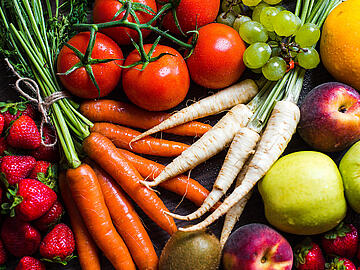Workshop
How to promote climate-friendly diets? Challenges and opportunities in Practice

+++ Update: The workshop is postponed to lower the risk of Corona infections. We plan to hold it in autumn 2020 instead. A new date will be announced here. +++
The Climate Action Program 2030 by the German government recognizes the potential of a reduction in the consumption of animal products to limit greenhouse gas emissions, yet concrete measures are not foreseen. Considering the EU’s aim to achieve greenhouse gas neutrality by 2050, steps to reduce emissions from diets should be taken proactively.
Meanwhile, the climate impact of food consumption has grown more important in the public eye. Therefore, practitioners – such as the Studentenwerk Schleswig-Holstein – would like to offer more sustainable dishes and motivate guests to eat more sustainably. However, it is not always clearly visible for consumers which products are more climate-friendly because production, transport, storage and preparation can lead to vastly different CO2-footprints. Additionally, eating habits are deeply ingrained and thus difficult to change.
To identify successful ways to make climate-friendly diets more attractive, the Studentenwerk has granted researchers of the University of Kiel and the Kiel Institute for the World Economy access to its canteens across Schleswig-Holstein to conduct experiments. Over a period of two years the researchers have tested different approaches for labelling dishes and their effects on consumer behavior. The project Instruments to promote climate-friendly diets IFkE was financially supported by the Gesellschaft für Energie und Klimaschutz Schleswig-Holstein GmbH (EKSH).
The workshop is targeted at practitioners and stakeholders from the food and agricultural sector. It will discuss the environmental impacts of food production and consumption, the challenges of climate impact assessment and ways to promote more climate-friendly food choices.
Venue
Kleiner Saal in Mensa I (1st floor)

